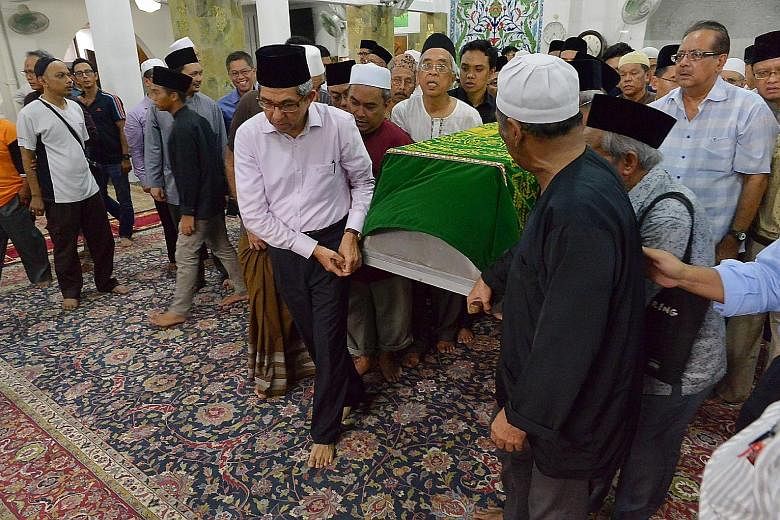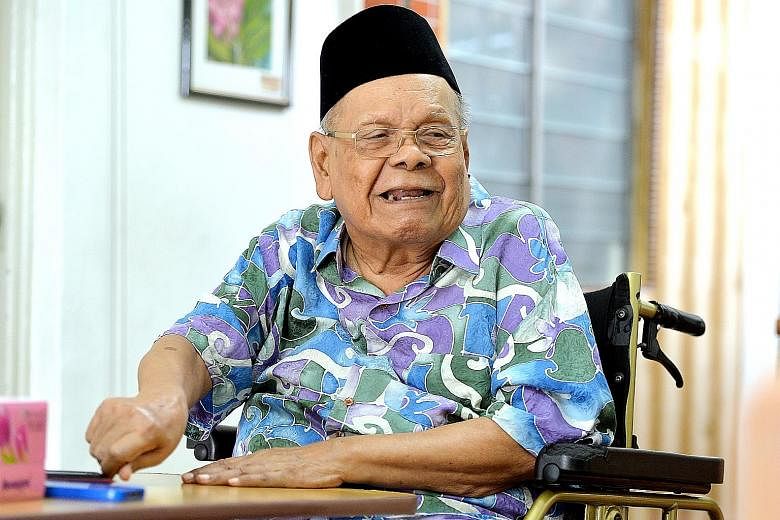Veteran writer Muhammad Ariff Ahmad, who had a hand in crafting the lyrics to Singapore's National Anthem and was a literary giant in the Malay community, died from heart failure yesterday morning.
The 91-year-old retired lecturer was admitted to Khoo Teck Puat Hospital last week after complaining of breathing difficulties, family members said.
He leaves behind his wife, retired teacher Sarinah Haniff, 85, four children aged between 51 and 62, and six grandchildren.
Affectionately known as Cikgu Ariff ("cikgu" is Malay for teacher), he was widely respected as an authority on the Malay language, literature and culture. He taught the language in primary and secondary schools for nearly 20 years, then moved to lecturing trainee teachers at the then Institute of Education. He retired in 1979.
Awarded Singapore's highest literary honour, the Cultural Medallion, in 1987, he helped late composer Zubir Said with the National Anthem. In a 2014 interview with The Straits Times, Dr Ariff said he suggested simplifying the lyrics so non-Malays could understand them, leading to the first four words, which were simply: "Mari kita rakyat Singapura".
Minister-in-charge of Muslim Affairs Yaacob Ibrahim attended funeral prayers for Dr Ariff yesterday afternoon, alongside over 300 family members and well-wishers at Ba'alwie Mosque in Lewis Road. He said Dr Ariff, as one of Singapore's pioneers, made tremendous contributions to the community.
"Currently, there are plans to put together a collection of all his poetry works from the past 40 to 50 years," he added, urging the younger generation to continue his legacy. "One way is to look into expanding the usage of the Malay language not only as the national language but also to be used by everyone in society."
Students and teachers described him as an approachable mentor who was always ready to impart his knowledge. Mr Abdul Semat Ali, 69, the honorary secretary of regional writers' group Asas 50 that Dr Ariff helped to found, said he was like a "walking dictionary". The group fostered a sense of Malay nationalism through language.
"My father would willingly give his knowledge without asking for anything in return, for the benefit of the community," said Dr Ariff's third child, primary school teacher Ms Shahrulbariah, 54.
Two accidental falls in 2013 impeded Dr Ariff's mobility and made him unable to write with a pen or type on a computer keyboard, but he ploughed on with literary work.
A book of poetry that he completed five months ago, Pantun Mas ("pantun" is Malay for "poetry", while Mas was one of his pen names), will be launched on April 9 at the National Library.
He did it by tapping out lines on his phone, embodying the spirit of a five-line poem he hastily jotted down on a cigarette box while waiting for a train from Perak to Singapore in 1949: "Go on... till you reach the end of the road; until you reach your journey's goal, or until you cannot walk!"



